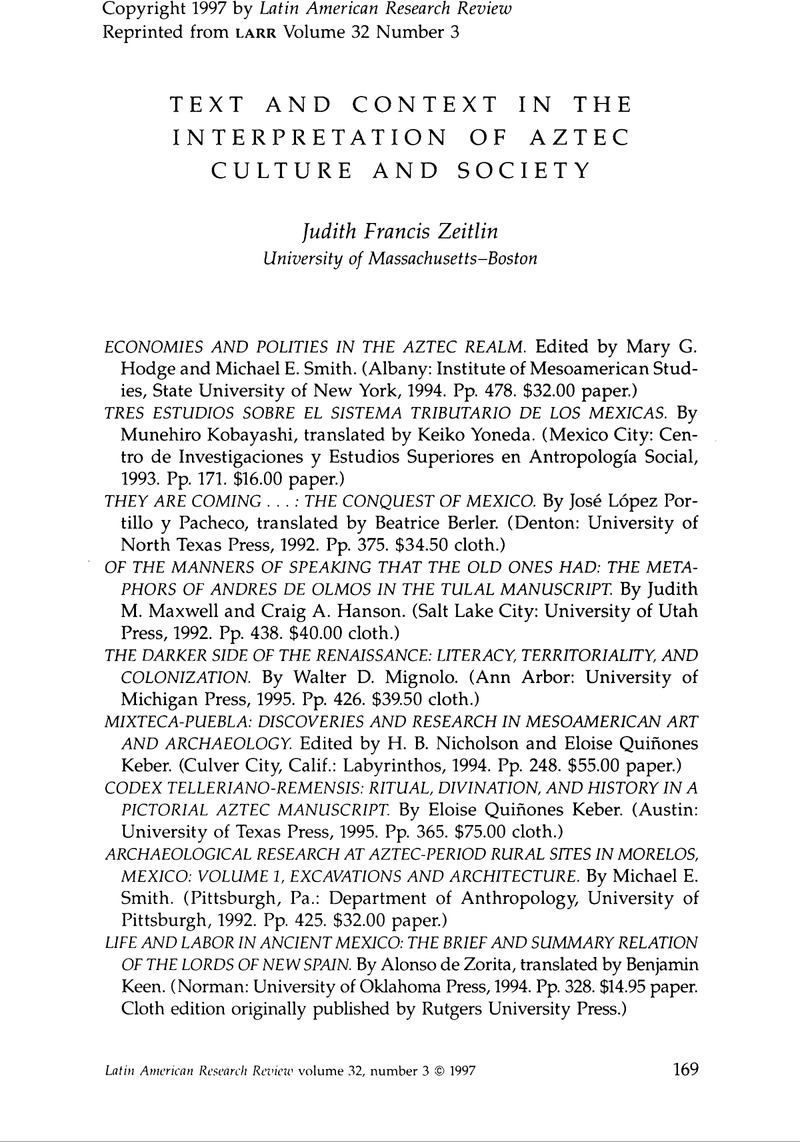No CrossRef data available.
Article contents
Text and Context in the Interpretation of Aztec Culture and Society
Review products
Published online by Cambridge University Press: 05 October 2022
Abstract

- Type
- Review Essays
- Information
- Copyright
- Copyright © 1997 by the University of Texas Press
References
Notes
1. Ian Hodder's theoretical position has been articulated in many recent works. See especially the influential British archaeologist's essay “Postprocessual Archaeology” in Advances in Archaeological Method and Theory, vol. 8, edited by Michael B. Schiffer (New York: Academic Press, 1985), 1–26; or his book, Reading the Past: Current Approaches to Interpretation in Archaeology (Cambridge: Cambridge University Press, 1986).
2. See, for example, such recent works as Mignolo's “Signs and Their Transmission: The Question of the Book in the New World,” in Writing without Words: Alternative Literacies in Mesoamerica and the Andes, edited by Elizabeth Boone and Walter Mignolo (Durham, N.C.: Duke University Press, 1994), 220–70; and his response in these pages to Patricia Seed's distinction, “Colonial and Postcolonial Discourse: Cultural Critique or Academic Colonialism?” LARR 28, no. 3 (1993):120–34.
3. Scholars like James Lockhart have for some time embraced the “new philology” in charting the social significance of language change in colonial Nahua texts. See especially his recent books, The Nahuas after the Conquest: A Social and Cultural History of the Indians of Central Mexico, Sixteenth through Eighteenth Centuries (Stanford, Calif.: Stanford University Press, 1992); and Nahuas and Spaniards: Postconquest Central Mexican History and Philology (Stanford and Los Angeles: Stanford University Press and UCLA Latin American Center, 1991).
4. In addition to Lockhart, other students of colonial Nahua hybrid texts whose works would have provided interesting comparisons are John Bierhorst, Cantares Mexicanos: Songs of the Aztecs (Stanford, Calif.: Stanford University Press, 1985); Louise Burkhart, The Slippery Earth: Nahua-Christian Moral Dialogue in Sixteenth-Century Mexico (Tucson: University of Arizona Press, 1989); Susan Gillespie, The Aztec Kings: The Construction of Rulership in Mexica History (Tucson: University of Arizona Press, 1989); and Susan Schroeder, Chimalpahin and the Kingdoms of Chalco (Tucson: University of Arizona Press, 1991).
5. See Excavations at Cihuatecpan, an Aztec Village in the Teotihuacan Valley, edited by Susan R. Evans, Vanderbilt University Publications in Anthropology no. 36 (Nashville, Tenn.: Vanderbilt University, 1988).
6. Mary G. Hodge, Aztec City-States, Memoirs of the University of Michigan Museum of Anthropology, no. 18 (Ann Arbor: University of Michigan, 1984).




